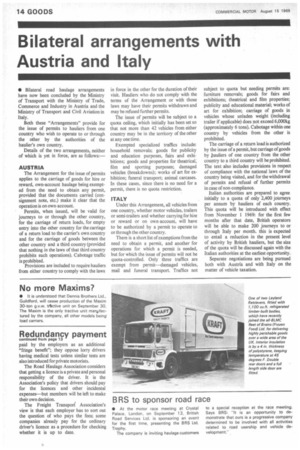Bilateral arrangements with Austria and Italy
Page 16

If you've noticed an error in this article please click here to report it so we can fix it.
• Bilateral road haulage arrangements have now been concluded by the Ministry of Transport with the Ministry of Trade, Commerce and Industry in Austria and the Ministry of Transport and Civil Aviation in Italy.
Both these "Arrangements" provide for the issue of permits to hauliers from one country who wish to operate to or through the other by the authorities of the haulier's own country.
Details of the two arrangements, neither of which is yet in force, are as follows:— AUSTRIA The Arrangement for the issue of permits applies to the carriage of goods for hire or reward, own-account haulage being exempted from the need to obtain any permit, provided that the documents carried (consignment note, etc.) make it clear that the operation is on own-account.
Permits, when issued, will be valid for journeys to or through the other country, for the carriage of return loads, for empty entry into the other country for the carriage of a return load to the carrier's own country and for the carriage of goods between the other country and a third country (provided that nothing in the laws of that third country prohibits such operations). Cabotage traffic is prohibited.
Provisions are included to require hauliers from either country to comply with the laws in force in the other for the duration of their visit. Hauliers who do not comply with the terms of the Arrangement or with those laws may have their permits withdrawn and may be refused further permits.
The issue of permits will be subject to a quota ceiling, which initially has been set so that not more than 42 vehicles from either country may be in the territory of the other at any one time.
Exempted specialized traffics include: household removals; goods for publicity and education purposes, fairs and exhibitions; goods and properties for theatrical, film and sporting purposes; damaged vehicles (breakdowns); works of art for exhibition; funeral transport; animal carcases. In these cases, since there is no need for a permit, there is no quota restriction.
ITALY Under this Arrangement, all vehicles from one country, whether motor vehicles, trailers or semi-trailers and whether carrying for hire or reward or on own-account, will have to be authorized by a permit to operate to or through the other country.
There is a short list of exemptions from the need to obtain a permit, and another for operations for which a permit is needed, but for which the issue of permits will not be quota-controlled. Only three traffics are exempt from permit—damaged vehicles, mail and funeral transport. Traffics not subject to quota but needing permits are: furniture removals; goods for fairs and exhibitions; theatrical and film properties; publicity and educational material; works of art for exhibition; carriage of goods in vehicles whose unladen weight (including trailer if applicable) does not exceed 6,000kg (approximately 6 tons). Cabotage within one country by vehicles from the other is prohibited.
The carriage of a return load is authorized by the issue of a permit, but carriage of goods by hauliers of one country from the other country to a third country will be prohibited. The text also includes provisions in respect of compliance with the national laws of the country being visited, and for the withdrawal of permits and refusal of further permits in case of non-compliance.
Italian authorities are prepared to agree initially to a quota of only 2,400 journeys per annum by hauliers of each country. This quota will be introduced with effect from November 1 1969: for the first few months after that date, British operators will be able to make 200 journeys to or through Italy per month. this is expected to entail a reduction in the present level of activity by British hauliers, but the size of the quota will be discussed again with the Italian authorities at the earliest opportunity.
Separate negotiations are being pursued both with Austria and with Italy on the matter of vehicle taxation.






































































































